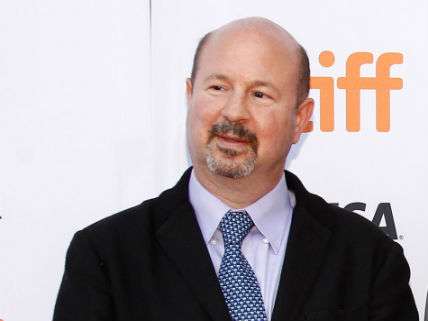Climate Scientist Michael Mann's Defamation Lawsuit Against Critics Can Proceed, Rules Court
'Trump hasn't even taken office and it's already becoming easier to sue people for defamation.'

Climate science is politicized from top to bottom. One of the nastier spats occurred in 2012 when Competitive Enterprise Institute (CEI) policy analyst Rand Simberg intemperately denounced Pennsylvania State University climate researcher Michael Mann as "the Jerry Sandusky of climate science."* Sandusky, of course, was the Nittany Lion football coach convicted of child molestation. Simberg was critiquing the fact that the Penn State had just exonerated Mann of accusations of scientific misconduct. Columnist Mark Steyn piled on in the National Review declaring that the university's "'investigation' by a deeply corrupt administration was a joke."*
Mann sued CEI, Simberg, Steyn and National Review for defamation. The defendants all moved that Mann's case be dismissed on grounds that their observations and opinions were protected by the free speech guarantees of the First Amendment. Now the D.C. Court of Appeals has ruled that Mann's defamation lawsuit may proceed. In her opinion for the three-judge panel Judge Vanessa Ruiz wrote:
Tarnishing the personal integrity and reputation of a scientist important to one side may be a tactic to gain advantage in a no-holds-barred debate over global warming. That the challenged statements were made as part of such debate provides important context and requires careful parsing in light of constitutional standards. But if the statements assert or imply false facts that defame the individual, they do not find shelter under the First Amendment simply because they are embedded in a larger policy debate.
Over at The Washington Post's Volokh Conspiracy, Case Western Reserve University law professor Jonathan Adler warns that the court's decision "is tremendously unfortunate, as it threatens to make it too easy for public figures to file lawsuits against their critics and, as a consequence, threatens to chill robust political debate."
So what's the threat to free speech? Adler explains:
Given that Mann is a public figure for the purposes of this litigation, under D.C.'s anti-SLAPP law, he could only prevail if the court could conclude there was a reasonable likelihood that a reasonable jury could find, by "clear and convincing evidence" that Steyn and Simberg acted with "actual malice" or a "reckless disregard" of the truth or falsity of the claims at issue.
Adler further notes that in its decision the D.C. Appeals Court relied on the Penn State investigations that purportedly exonerated Mann for evidence of actual malice on the part of the critics. The court is evidently suggesting that CEI, Simberg, and Steyn cannot in good faith criticize the findings of such an official "investigation" which was precisely what they were doing. Adler points out the inherent contradiction of court's decision:
It cannot be that once some official body has conducted an investigation of an individual's conduct, that further criticism of that individual, including criticism that expressly questions the thoroughness or accuracy of the investigatory body, is off limits. By this standard it would be defamatory to express the opinion that George Zimmerman or Darren Wilson is a murderer, even if one also argued that the reason either was exonerated was because of structural racism in the criminal-justice system. After all, each was investigated, tried and found not guilty. Nor is it consistent with existing First Amendment doctrine to suggest that hyperbolic accusations of bad faith or dishonesty against public figures involved in policy debates are actionable. The court's approach is particularly problematic here because both Simberg and Steyn offered reasoned (if also intemperate) explanations for why they did not credit the investigations and why they believed that these investigations failed to uncover the misconduct they believe occurred. Yet according to the court, the existence of these investigations could be sufficient for a jury to find, by "clear and convincing evidence," that they acted with actual malice.
In a statement responding to the court's decision, CEI General Counsel Sam Kazman declared:
Today's ruling simply means this case will proceed and the Superior Court will now consider the merits of both sides' arguments. The Competitive Enterprise Institute is a staunch defender of free speech and open, public debate, and we are confident we'll prevail on the merits as this case goes back to Court. As a public figure with his own history of harshly attacking those who disagree with him, Michael Mann must now show that CEI's commentary met some very stringent standards of malice. It did not, and we will continue to fight against those who seek to punish and harass groups and individuals who speak out on controversial issues.
As Adler tweeted: "Trump hasn't even taken office and it's already becoming easier to sue people for defamation."
*These quotations are taken from the Appendix of the D.C. Court of Appeals decision.


Show Comments (135)